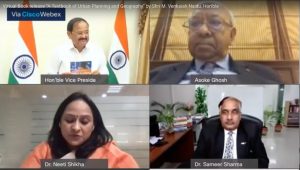A Virtual Book Release of A Textbook of Urban Planning and Geography written by Sameer Sharma was organised by PHI Learning Private Limited – a renowned Indian Academic Publisher with 58 years of experience in the Textbook Market – on January 20, 2021. The book was released by the Chief Guest Shri M. Venkaiah Naidu, Hon’ble Vice President of India.
The Vice President, Shri M. Venkaiah Naidu, said that Covid-19 pandemic has taught us the importance of good ventilation and sunlight for our health. He expressed his disapproval of the growing tendency of living in closed spaces and emphasised that proper air circulation must be ensured in homes, offices, restaurants and conference halls.
The Vice President made these remarks in Hyderabad while virtually releasing the book titled – A Textbook of Urban Planning and Geography written by Dr. Sameer Sharma, Director General and CEO of the Indian Institute of Corporate Affairs. Shri Naidu rued that in their aspiration for a modern lifestyle, city dwellers have lost connection with nature and many a time, we find that even sun rays don’t penetrate our homes. He advised city planners and architects to give precedence to comfort over the fashion and design structures and buildings which exist in harmony with nature. He wanted cities to have more breathing space such as parks, gardens and playgrounds. A tightly paved urban area is one of the reasons for runoffs during floods, he said.
Complimenting the author, Dr Sameer Sharma and the publisher for coming out with the book, Shri Naidu expressed happiness that the author has advocated home-grown solutions for cities based on our experiences and indigenous knowledge on city planning, rather than blindly aping the West. He said that this book is very timely as we go through a shift in how we view the ‘urban’ in the post-COVID era.
In his address to the participants, the Vice President said:
I would like to commend the author, Dr Sameer Sharma and the publisher for coming out with this book. I am happy to note that the author has advocated home-grown solutions for cities based on our experiences and indigenous knowledge on city planning, rather than blindly aping the West. This is a good suggestion that city planners must take note of.
May this book trigger many conversations, inspire more research in this field and spark new innovations in urban planning.
Dr. Sameer Sharma, Author of the book, Mr. Hitesh Vaidya, Director, National Institute of Urban Affairs, Mr. Asoke K Ghosh, Chairman and Managing Director, PHI Learning Private Limited were among the dignitaries who attended the virtual program.
This event was concluded with a word of thanks by Mr. Asoke K Ghosh, Chairman and Managing Director, PHI Learning Private Limited. While thanking the distinguished speakers and Honorable Vice President of India for sparing time from their busy schedule to join the event, he announced an introductory discount of 30% on the book. Mr. Asoke K Ghosh also mentioned that:
PHI Learning is a leading Indian academic publisher. Established in 1963 with the motto Helping Teachers to Teach and Students to Learn, we are committed to publish low-cost, high-quality affordable texts for the students across the globe.
In 58 years of publishing, we have published more than 5000 titles in various disciplines. All our books are written mostly by Indian Authors. We are marketing our books globally so that students in India and abroad get benefitted from the books published by us.
Keeping pace with digitisation, we also publish e-books for e-learning. Our e-books are available on online platforms like Amazon Kindle, Nook and Google Play. If you want to learn more about us, I encourage you to browse our website www.phindia.com
About the Title “A Textbook of Urban Planning and Geography“
This book has a strong potential to empower Indian universities’ students to craft and implement new approaches, unconstrained by orthodox theories and biases in the field
of urban geography and urban planning. The present text reconceptualises Indian urban studies by dissecting western theories, concepts, paradigms, and principles and practices, and placing them alongside how Indians experience their urban landscapes. Such juxtaposing analysis allows readers to break from their past inferences of the structure and dynamics of Indian cities and enable researchers to make exploratory assumptions.
Primarily intended for the students of Geography and Urban Planning, the book covers the evolution of urban structures and dynamics of settlements in India, mainly after India’s Independence. There are seven chapters in the book. First three chapters describe and explain the evolution of Indian settlements up to the present. The next four chapters focus on regions, urban planning, urban governance and the social landscape of Indian cities. Each chapter ends with a set of short and long answer questions.
Key Features
- Extensive coverage of the syllabi prescribed in Indian academic institutions
- Strategically organised text of each chapter for the ease of learning
- Abundant case studies in each chapter
- Chapter-end short-answer, long-answer and fill-in-the-blank type exercise problems
The book (both in e-book and print book formats) is available for purchase through all leading e-commerce websites including www.phindia.com.
About the Author
SAMEER SHARMA (PhD in metropolitan development, University of Cincinnati, USA) is First Missions Director India: Smart City Mission Atal Mission for Rejuvenation and Urban Transformation (AMRUT) and Capacity Building for Urban Development. He is also a researcher in metropolitan and regional development as well as a practitioner in urban development. He has taught courses on ‘spatial structures’ and ‘statistics for urban planners’ to postgraduate students in the USA.
He has published several academic papers, research papers on spatial economics, social capital and metropolitan development, contributed several articles to many widely read newspapers, written two books, and contributed chapters in many books. He has also worked as Municipal Commissioner of three cities in India. He has won more than seven awards and appreciations, including the President’s Award for Best State in the promotion of Community Organisations in slums (2014) and the V. Ramachandran Award for Excellence in implementation of urban decentralisation.



Leave a Reply